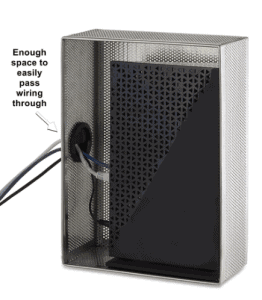We ♥︎ honesty! Beat EMF may earn a commission through links on this page at no additional cost to you.
This post is for those of you who have your home office in your bedroom.
Or if you store your WiFi router in your bedroom for whatever reason.
I want to talk to you about why you may want to reconsider its location…
And how doing so could help you sleep better!
How WiFi Affects Your Sleep
In this digital era of connectivity, it’s almost impossible to go a day without using WiFi.
But while convenient, WiFi poses a threat that too few people realize.

ELIMINATE THE MYSTERY (& OVERWHELM) OF EMF PROTECTION
Get a self-paced, step-by-step path to less EMF in your life—without weighing you down with complicated terminology & information overload.
This is because wireless technology produces electromagnetic fields (EMF) in the radiofrequency range.
Prolonged exposure can cause mild symptoms ranging from headaches all the way to more severe conditions like cancer.
See for yourself…the WHO classified radiofrequency as a Group 2B Carcinogen in 2011.
Keeping in mind these possible effects, you do NOT want to spend your beauty sleep near a source of radiation like what’s emitted from a WiFi router.
But let’s take a closer look at exactly how WiFi affects our sleeping patterns:
First, a 2012 study found that even at low exposure, sleeping beside WiFi-connected devices and routers can alter your brain’s signals and overall activity. Journal of Sleep Research
Second, the whole reason you have a WiFi router hooked up is to send data to your devices.
Those screens emit blue light, which stimulates your eyes and signals your brain to decrease the sleep hormone, melatonin.
The blue light basically tricks your brain into thinking that it’s still day time, which means it’s not the time to sleep.
Long story short, cell phone and computer screens make it very difficult to fall asleep at night.
Sleeping Near a Wifi Router Is Linked to Insomnia
Before we dig into our discussion on how WiFi disrupts our sleep patterns, let’s take a minute to review why we need proper sleep in the first place.
Remember that the specific type of sleep we need most for restoration is “Delta-Rhythm Sleep” – not Rapid-Eye-Movement (REM) sleep.
When you enter Delta-Rhythm Sleep, your body enters a phase of sleep where your organ systems, brain, and heart slows to a certain extent, allowing excess ATP to build inside our cells.
ATP is basically the energy that helps our neurological and physiological systems to fully repair.
ATP is also involved in boosting our immune systems, conducting hormone synthesis, and performing memory consolidation.
In a nutshell, without enough ATP, our bodies are unable to repair and regenerate overnight, which will eventually cause our physical and mental capacities to break down.
That’s why good quality sleep is so, SO important to maintain optimal body function and a sharp mind.
But here’s where EMF comes in and messes everything up…
According to this study, when we use our electronic devices or stay exposed to WiFi routers, we absorb radiofrequency waves that damage our mitochondria.
EMFs like these can also modify the brain in such a way that it enters a stressful beta state. That alone can fully prevent you from entering the much needed Delta-Rhythm Sleep phase. Sleep Disorder & Radiofrequency (RF) Fields
And that, my friend, results in insomnia.
Plus, radiofrequency fields (RF) – which are the fields WiFi routers use to operate – are carriers of telecommunication signals.
These types of signals are known to alter your DNA and prevent it from fully repairing.
As a result of DNA damage, a thread of complicated health conditions can occur.
And last but not least…
RF microwaves can overpower and/or interfere with our own natural electromagnetic fields. Think about how your heart and brain operate via electrical signals.
These fields need to flow undisturbed to maintain optimal balance and operation.
Disruption leads to dysfunction in both your psychological and physiological well-being.
Other WiFi Sleep Disturbances
Apart from radiofrequency waves, there are other factors from WiFi technology that can cause sleep disturbances.
I know briefly mentioned blue light and the problem it poses, but it’s important enough to explain & understand on a deeper level.
Research from the University of Haifa and Assuta Sleep Clinic found that short-wavelength blue light coming from our devices disrupts the body’s sleep cycle.
More specifically, this blue light can reduce a person’s sleep duration by 16 minutes and suppress melatonin levels in the body.
The result of low melatonin is a negative change in our body’s natural mechanisms and biological functions.
Because melatonin does soooo much more than encourage sleep.
The biggest thing I want you to take away regarding this kind of light is this:
The blue light from your cell phone can suppress the production of melatonin TWICE as much as other types of light wavelengths.
And this causes your circadian rhythm (your internal body clock) to CHANGE.
Looking at the situation from a broader sense, it’s not just the devices and WiFi routers themselves that can cause lack of sleep…
It can simply be the high-speed internet connection.
Think about it:
With lightning-fast internet, people are more likely to engage in online activities and give less priority to sleep.
There’s just too much going on…too many things to do!
Ever since the rise of high speed internet, more and more people aren’t getting the required 7-9 hours of quality sleep.
And like I pointed out earlier, sleep is so important to overall health.
So Is It Safe to Sleep Beside a Wifi Router?
Considering all the information we’ve discussed so far, it’s my opinion that sleeping beside a WiFi router is contradictory to a healthy mind and body.
Think of it this way…
Would you really let your body be exposed to harmful radiation for more than 8 hours a day? Of course not.
But that’s exactly what many people are doing.
Sleeping is the time when your system regenerates so it can perform well the next day. When you don’t get enough quality sleep, that “body reset” doesn’t happen.
So I highly encourage you to NOT sleep with a WiFi router in your bedroom.
And please, please don’t put your wifi router under your bed.
How to Block WiFi Router Radiation in Your Bedroom
Now that you’re aware of the harmful effects WiFi routers can have on your body, the next step is to make sure you’re protected.
Here are some tips you can follow to block WiFi router radiation in your bedroom:
1. Relocate it
Bet you didn’t see that one coming! Kidding, of course. But really, this is the best course of action.
For most of us, there’s no other room in your home where you spend 8-9 hours straight per day.
So the bedroom is literally the worst place for your WiFi router.
Take a look at your situation, consider your options, and try to find a new place for it.
2. Turn off your WiFi router at night
If it simply cannot be relocated outside your bedroom, at least turn it off at night.
The easiest way to turn your WiFi router off is to unplug the modem when you go to bed.
You can even plug your router in a timer so that it can automatically switch off.
But that timer will more than likely generate electric fields…so I’d skip it and just turn it off manually.
3. Turn off all devices or choose airplane mode
Don’t forget to power off the devices connected to WiFi. Remember, WiFi routers aren’t the only source of EMF.
You can still access the net with your cellphone’s mobile data.
If you’re not comfortable turning them off, at least put your tablets and cell phones on airplane mode, which eliminates the connection.
In addition to that, be sure that WiFi printers are also turned off.
And it’s good practice to avoid using device screens about 3 hours before bed to protect your melatonin production.
4. Use a WiFi router cover
For daytime use, you can decrease your RF exposure by up to 99% by using a shielded cover or cage like this one.

If you’re on a budget, you can even get one of those super cheap mylar blankets (made of aluminum) and wrap your router in it.
Just be sure it is completely covered – no gaps.
If you want more information, check out my guide on the best wifi router guard options.
5. Stick to your “ancient” tech
My family pokes fun at me because I have all the old school gadgets. My printer actually has to connect with a wire *GASP*
Most of the devices we use in our offices are going wireless.
And even if you choose to connect via wire, they have built-in transmitters that are always searching for bluetooth devices to pair with.
And blasting you with radiofrequency radiation in the process…
If you can, avoid giving in to these upgrades. Instead, choose gadgets with cables and ethernet connections.
If you have a WiFi router in your bedroom, I really hope this article encourages you to consider a new location!
Let me know if you have any questions in the comments below.
Certified EMF Expert, Chief Editor & Researcher at Beat EMF. I’m in charge of testing all the products and sorting through the duds to deliver effective EMF solutions for your family. Learn more about me here.



